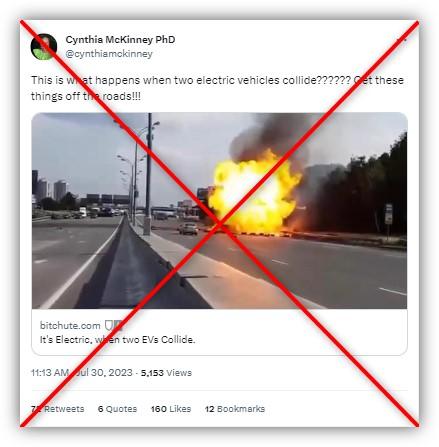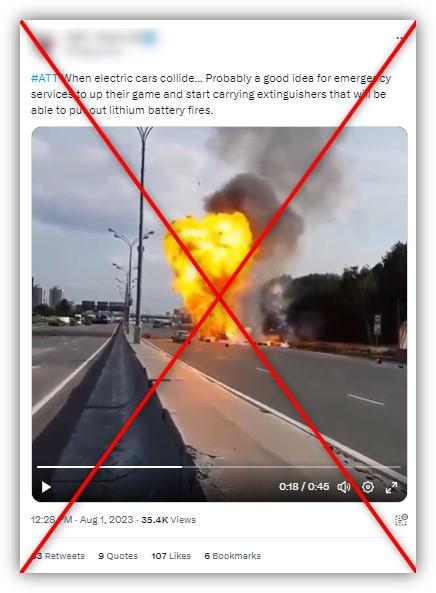
Highway explosion video misrepresented as EV collision
- This article is more than one year old.
- Published on August 3, 2023 at 22:05
- 5 min read
- By Bill MCCARTHY, AFP USA
Copyright © AFP 2017-2025. Any commercial use of this content requires a subscription. Click here to find out more.
"This is what happens when two electric vehicles collide?????? Get these things off the roads!!!" says a July 30, 2023 post from Cynthia McKinney, a former Democratic US congresswoman who later joined the Green Party.

The post links to a BitChute video showing a series of fiery explosions on a freeway, with the blazes and smoke shooting high into the sky.
Similar posts shared the same clip in various languages across Twitter, which is rebranding as "X," and other platforms including Facebook, YouTube and TikTok.

The posts spread after a cargo ship loaded with electric vehicles caught fire off the Dutch coast in late July.
But the highway footage is years-old and shows an incident set off not by an electric vehicle crash, but by a truck carrying gas cylinders.
Reverse image and keyword searches revealed the same footage posted by Russian YouTube channels as early as July 13, 2013 (archived here).
Other videos posted the same day show the fire from different angles (archived here, here and here), with one clip showing the moment the truck slammed into a bus in front of it (archived here).
Russian news agencies including RIA Novosti reported at the time that the crash involved an Isuzu truck carrying 119 gas cylinders and a bus with 28 people on board, with the fire caused by the cylinders exploding in the continuous blasts captured on video (archived here). The dispatch said the driver was injured and received assistance, but it did not report any other casualties.
Some individual cylinders can be seen catching fire or shooting across the pavement in the YouTube footage of the accident.
AFP geolocated the footage to a stretch of European route E115 near the Moscow Automobile Ring Road in Moscow (archived here).
The US National Transportation Safety Board (NTSB), the independent agency that investigates major transportation accidents, has not examined any collision involving two electric vehicles crashing into each other, a spokesperson told AFP.
The share of electric vehicles in the United States is small but growing. Isuzu introduced its first all-electric commercial truck in March.
Electric vehicle fire risk
There is a fire risk to electric vehicles, with rare blazes posing a new challenge for first responders because when they occur they last longer, burn hotter and require more water to extinguish.
A strong enough collision could theoretically trigger an explosion if the battery pack's encasing were to break and the battery cells inside were damaged, said mechanical engineering professor Elham Sahraei, director of Temple University's Electric Vehicle Safety Lab.
"If the crash is severe enough that the protective shield gets damaged and the battery cells inside get punctured, the kind of footage in the videos would not be unreasonable or impossible," Sahraei told AFP.
The University of Central Florida's Yang Yang, who has developed technology aimed at preventing electric vehicle fires, agreed.
"If two (electric vehicles) have a collision and break the battery pack, the batteries will have a short circuit, and the stored chemical energy in the batteries will be released as thermal energy, which is explosion or burning," Yang told AFP in an email. "Something like you light fireworks in a very confined space."
But the majority of accidents between electric vehicles can be expected to be similar to those involving gasoline-powered cars, Sahraei said.
Battery packs in electric cars are covered by sturdy trays and protective shields that should prevent damage to the battery during crashes of "average severity," she said.
Joe Young, media relations director for the nonprofit Insurance Institute for Highway Safety, said that the organization has run about 60 high-speed crash tests of various electric vehicle models, with none leading to fires. He told AFP he did not know of any reliable data counting post-crash fires among the cars in the real world.
Overall, there remain a lot of unknowns with regard to the safety of electric cars, Sahraei said. And with far fewer of them on the roads compared with gas vehicles, the data is indeed limited.
One 2022 report (archived here) from the online car insurance marketplace AutoinsuranceEZ, which analyzed data from the NTSB and Bureau of Labor Statistics, found that hybrid vehicles had the most fires per 100,000 sales, followed by gasoline vehicles and electric vehicles.
Newcastle University's Paul Christensen, whose research focuses on lithium-ion battery fires and safety, pointed to separate data from EV FireSafe (archived here), an Australian company focused on the issue.
The company has logged nearly 500 electric vehicle battery fires globally between 2010 and June 2023, categorizing each by its cause, location and whether it was an ignition or an explosion.
"I am not aware of any collisions involving (electric vehicles) resulting in explosions," Christensen told AFP.
AFP has previously debunked false posts claiming an electric bus caught fire in Kenya, as well as other misinformation about electric cars here, here and here.
Is there content that you would like AFP to fact-check? Get in touch.
Contact us




